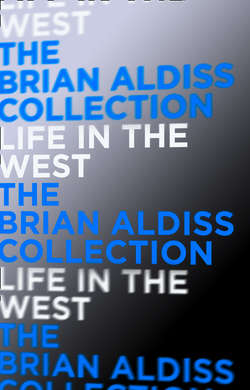Читать книгу Life in the West - Brian Aldiss - Страница 7
Introduction
ОглавлениеWhen I began to write the Squire Quartet my intention was to portray something of the world I was living in, from the 1980s onwards. I found most of that world exciting – enticing to experience and to record.
This, the first volume of the Squire Quartet, brisk and chatty, was published on March 6th 1980 – as a loving card from my wife, still tucked into her copy of the book, reminds me. We were living on a quiet North Oxford street and our younger children were seriously into education. We were always moving house, depending on our fortunes.
I had been attending a conference in Palermo – a conference with a strong Communist flavour, not particularly enjoyable. It was over. I was standing on the dockside, looking north over the sea. A story began to build up in my mind: the conference; the players from various countries, where the economic blocs seemed irreconcilable; and at the same time, a man’s – Sir Thomas C. Squire’s – difficulties at home.
Once I returned to our house in Charlbury Road, I launched into the novel. My mother died during that period; a melancholy event recorded when Squire’s mother dies just before Christmas. You have to go on, whatever happens. Maybe the army taught me that. Or maybe I had known it even as a small boy. Anyhow, Squire also has to press on. Trouble in Yugoslavia, where he is almost killed. Separation from Teresa, his wife. More human experience, more meditation. More striving to penetrate the thickets.
The novel opens with Squire in Ermalpa, Sicily, for a conference on the popular arts, dubbed ‘the arts of no refinement’. He claims that the pop art of one generation becomes the classic of the next: ‘Homer was, in his day, the Bronze Age equivalent of the TV soap opera.’ Squire is for the new, insisting we rise up to change.
Later, back at his Norfolk house, Pippet Hall, Squire is filming and being filmed. The traditional pretty girl in a swimsuit is with him. He remarks, ‘We are all symbols to each other as well as real people.’
It is the period of the Cold War – much discussion takes place. Squire and his wife quarrel bitterly.
Squire recalls a note given to him in Ermalpa, in which Vasili Rugorsky, the friendly Russian, proposes they visit Nontreale’s cathedral and that Squire pay the bus fare: ‘our government keeps us poor as saints.’
They get to Nontreale and enter the cathedral. Rugorsky praises the elaborate artwork. He says to the unimpressed Squire, ‘Without God, I can see no meaning in anything.’
‘Do you ever experience the feeling that you have come to a dead halt in your life?’ Rugorsky asks.
So the questioning goes on, the faltering marriage, the symbols, the seasons, life itself …
Brian Aldiss
Oxford, 2012
